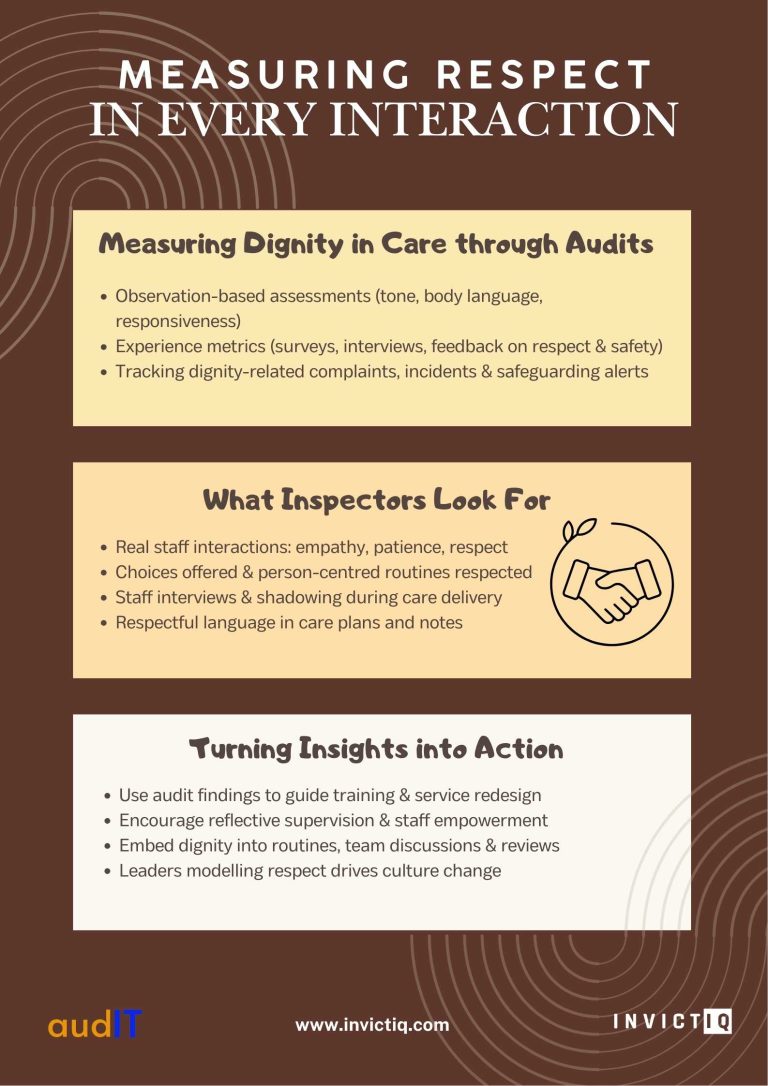@2021 invictIQ is a venture by Sprint Consultancy. All rights reserved. Privacy Policy.

It’s about being seen – elevating dignity through feedback and audits
by Mark Topps
Dignity and respect are more than nice to have values and form part of the social care regulations and CQC framework and these principles are both key to underpinning person-centred care. Whilst they underpin all we do, we still need a feedback structure, robust auditing and a culture that genuinely values the voices of those we support.
Let’s dive into how we can implement some of these essential pins:
The voice of the people we support
The first thing we need to ensure we are doing is listening to the people we are supporting. Not just their words, but their behaviours, their silence and how they experience care. Whether it’s a compliment about a kind care worker who has visited them or a concern about privacy during personal care, this feedback is the gold dust you want to search for. All too often, dignity related feedback is lost in the noise of operational pressures so make sure you set time to capture it.
To truly promote dignity, we must treat this feedback as the driver for quality improvement. By linking experiences directly to audit processes, we can identify patterns, uncover blind spots and make meaningful changes. For example, recurring concerns about rushed care might highlight staffing issues, poor rostering or training gaps that audits can help quantify and address.
We reached out to a group of people with lived experiences for quotes around the importance of feedback, and one came back to me which hit me hard which was:
“It’s not just about being clean and fed it’s about being seen. When staff take the time to ask how I’m feeling or remember how I have my coffee, that’s when I feel respected” – Margaret, 84
The above quote really isn’t much to deliver, knowing the way someone has their drink and having time to genuinely enquire about their wellbeing but unless you seek the things that are important to those you support, you won’t be able to truly meet their needs.
Utilising audits to measure dignity and respect
Modern audit tools that are utilising digital tools and AI are evolving to capture the nuances of dignity in care delivery. Beyond compliance checklists, they now include:
- Observation-based assessments including watching how staff interact with those they are supporting, tone of voice, body language and responsiveness.
- Experience metrics of the people being supported through surveys, interviews and feedback that ask direct questions about feelings of respect, autonomy and emotional safety.
- Incident tracking, dignity-related complaint monitoring and safeguarding alerts to identify systemic issues.
These tools not only improve the service you are delivering but enhance the outcomes and goals for the people you are supporting. When used consistently, they provide a clear picture of how dignity is embedded or missing in everyday practice.
What inspectors really look for
During inspections, regulators don’t just review policies, they assess culture. Inspectors observe how staff speak and interact, how choices are offered and whether care is truly person-centred. They look for signs of empathy, patience and respect in action.
Staff attitudes are often shaped by leadership and training. A culture that values dignity will show up in the smallest interactions such as knocking before entering a room, using preferred names, respecting personal routines, knowing the small details etc. Inspection frameworks increasingly include:
- Staff interviews to explore understanding of dignity.
- Shadowing exercises and observing real-time care delivery in care homes.
- Checking for respectful language in care plans and care notes.
In order to turn the insight from the audits and feedback into action, we really have to recognise that dignity is not a standalone issue but one that is woven into every aspect of care. Audit findings should be used to inform targeted training, reflective supervision and service redesign where needed. Staff must be empowered to act on what they hear and learn, not just tick boxes. Audit on Cloud Communications Module by InvictIQ further strengthens this by collecting and analysing stakeholder feedback using AI, ensuring that valuable insights are not missed and trends are identified early. Alongside this, the Audit module offers leaders an efficient way to structure, track and evidence compliance activities with confidence.
As leaders, we play a key role in modelling respectful behaviours and creating environments where dignity is celebrated, not just monitored. By embedding dignity into daily routines, team discussions and performance reviews, we move from reactive fixes to proactive culture-building where every resident and staff member feels seen, heard and valued.
MORE ARTICLES

Mark Topps is a social care leader who has worked in the care industry since 2004 and is currently working as a regional support manager. He regularly advocates, appearing on television, radio and podcasts and has started many campaigns for change in legislation and culture within the industry. Mark is the co-founder of The Caring View which is a social care podcast, YouTube show and free resource initiative for the sector. He also co-founded The Health and Social Care Club, which is an audio event hosted on LinkedIn. Mark is also the social media and marketing director at the National Association of Care and Support Workers.
Sign up for our newsletter

